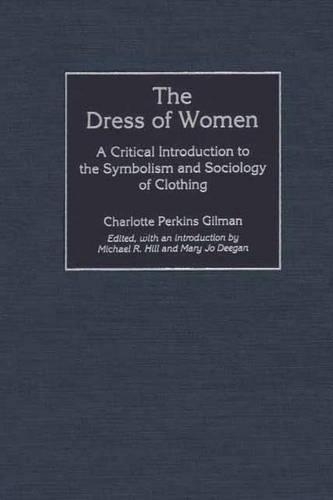
The Dress of Women: A Critical Introduction to the Symbolism and Sociology of Clothing
(Hardback)
Publishing Details
The Dress of Women: A Critical Introduction to the Symbolism and Sociology of Clothing
By (Author) Charlotte Perkins Gilman
Edited by Michael R. Hill
Edited by Mary Jo Deegan
Bloomsbury Publishing PLC
Praeger Publishers Inc
30th October 2001
United States
Classifications
Tertiary Education
Non Fiction
Cultural studies
Gender studies: women and girls
Sociology
Cultural studies: customs and traditions
306.4
Physical Properties
Hardback
192
Width 156mm, Height 235mm
425g
Description
Originally serialized in 1915 in The Forerunner, and never before published in book form, The Dress of Women presents Gilman's feminist sociological analysis of clothing in modern society. Gilman explores the social and functional basis for clothing, excavates the symbolic role of women's clothing in patriarchal societies, and, among other things, explicates the aesthetic and economic principles of socially responsible clothing design. The introduction, by Hill and Deegan, situates The Dress of Women within Gilman's intellectual work as a sociologist, and relates her sociological ideas to the themes she developed in some of her other works. Although written in 1915, Gilman's treatment of clothing and dress remains relevant. This pioneering effort adds substantially to Gilman's reputation as a sociological theorist and feminist. In addition, it represents one of the earliest full-length specifically sociological analyses of clothing and the fashion industry. Ultimately, the author concludes that harmful and degrading aspects of women's dress are amenable to reform if men and women will work together rationally to change the controlling institutional patterns of the society in which they live. This groundbreaking work will appeal to those interested in Gilman, feminist theory, sociological theory, social psychology, women's literature, and women's studies.
Reviews
While certainly Gilman enthusiasts will be pleased to read this fine example of her feminist and sociological insight, with Gilman's engaging prose, ans especially because of its contemporary relevance, The Dress of Women: A Critical Introduction to the Symbolism and Sociology of Clothing should be of interest to a wide range of readers.-Contemporary Sociology
"While certainly Gilman enthusiasts will be pleased to read this fine example of her feminist and sociological insight, with Gilman's engaging prose, ans especially because of its contemporary relevance, The Dress of Women: A Critical Introduction to the Symbolism and Sociology of Clothing should be of interest to a wide range of readers."-Contemporary Sociology
Author Bio
CHARLOTTE PERKINS GILMAN was an eminent feminist sociologist and novelist, perhaps best known for Women in Economics (1898) and, as a fiction writer, for her semi-autobiographical work The Yellow Wallpaper (1892). MICHAEL R. HILL is an interdisciplinary social scientist at the University of Nebraska-Lincoln and holds doctorates in both sociology and geography. He is the author of Walking, Crossing Streets and Choosing Pedestrian Routes (1984) and Archival Strategies and Techniques (1993), and editor or co-editor of Harriet Martineau's Women and Symbolic Interaction (1987) and Gilman's With Her in Ourland: Sequel to Herland (Greenwood, 1997). He edits the journal Sociological Origins. In 2000, Hill became Chairman of the History of Sociology section of the American Sociological Association. MARY JO DEEGAN is Professor of Sociology at the University of Nebraska-Lincoln. Her publications include Women and Disability (1985), Jane Addams and the Men of the Chicago School, 1892-1918 (1988), American Ritual Dramas (Greenwood, 1989), and Women in Sociology: A Bio-Bibliographic Sourcebook (Greenwood, 1991). She is editor of American Ritual Tapestry (Greenwood, 1998), George Herbert Mead's Play, School, and Society (1999), Essays in Social Psychology: George Herbert Mead's First Book (forthcoming), A Voice from Chicago: The Collected Works of Fannie Barrier Williams (forthcoming), and co-editor of Women and Symbolic Interaction (1987) and Gilman's With Her in Ourland: Sequel to Herland (Greenwood, 1997).
